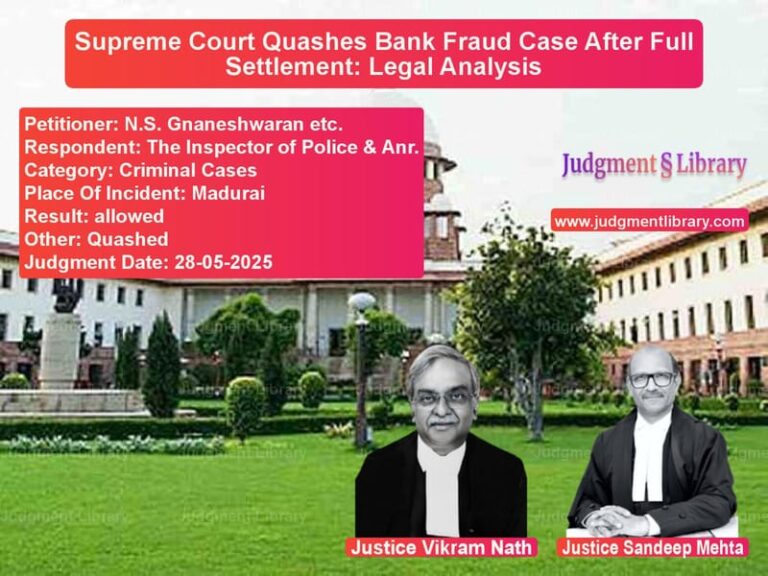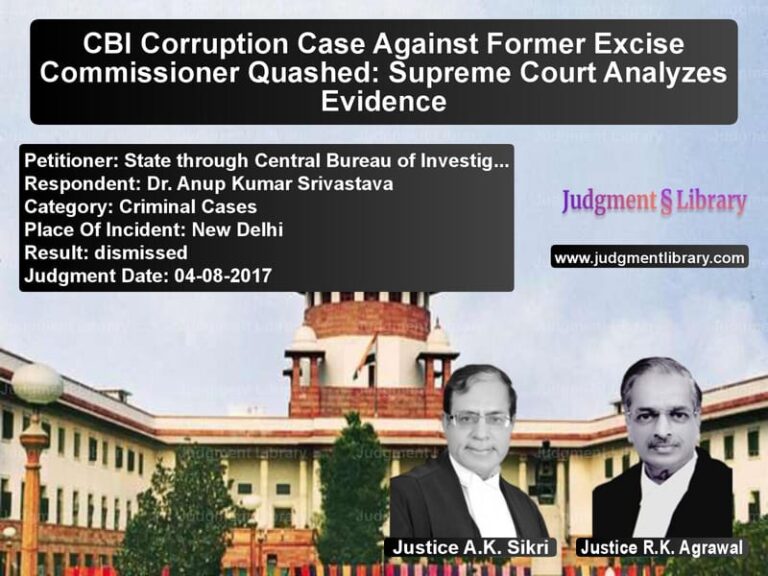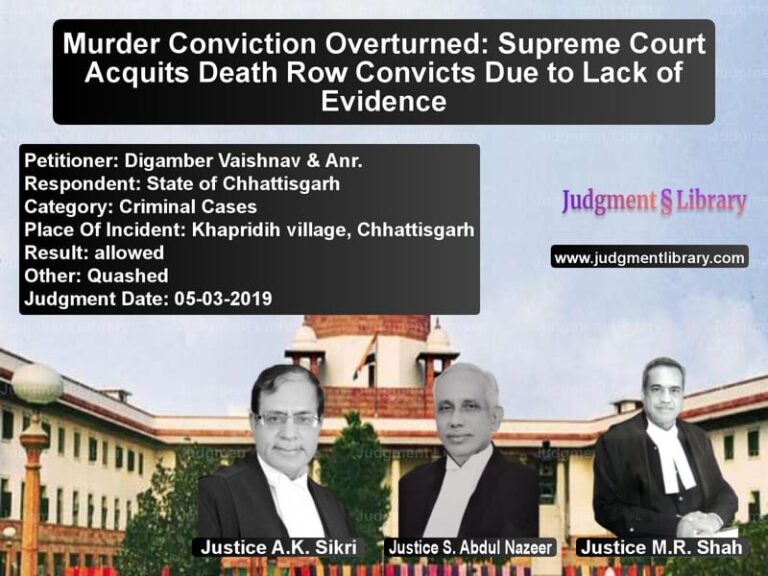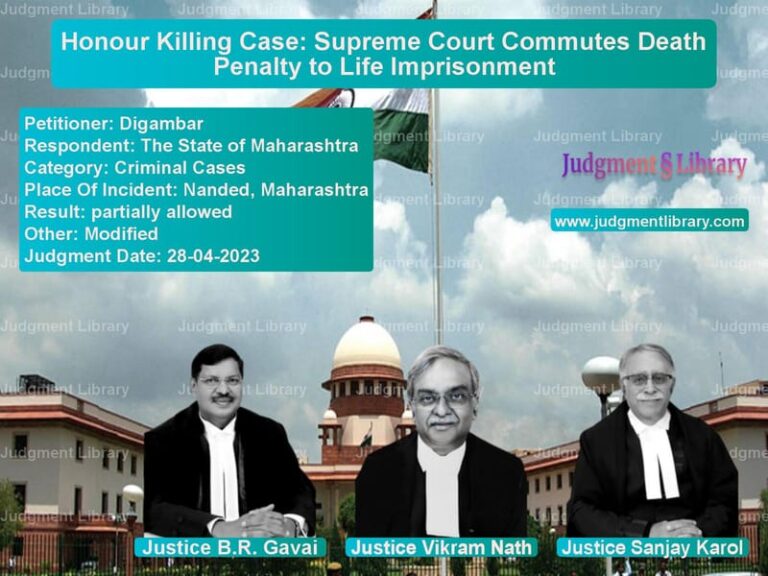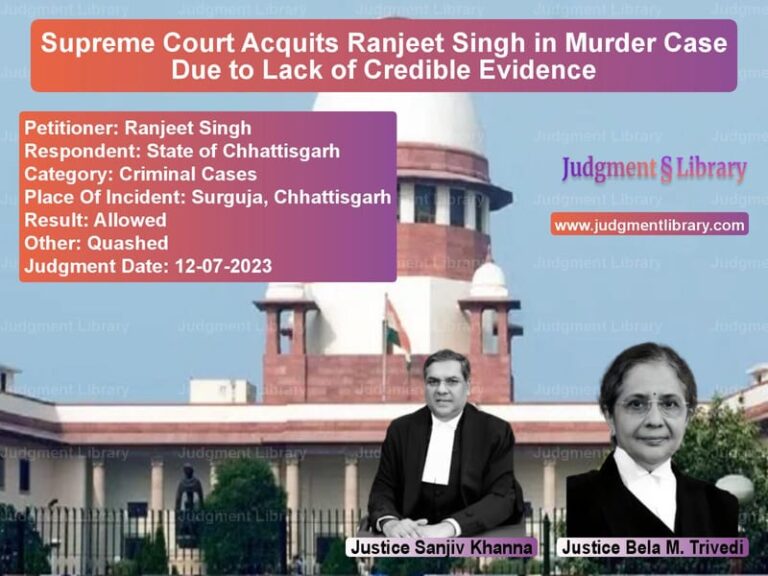Supreme Court Clarifies Power Purchase Agreement: RLNG Excluded from ‘Natural Gas’ Definition
The Supreme Court of India recently ruled in Transmission Corporation of Andhra Pradesh Ltd. & Others vs. M/s. GMR Vemagiri Power Generation Ltd. & Another, addressing a dispute over the interpretation of the term ‘fuel’ in a Power Purchase Agreement (PPA). The central question before the Court was whether the word ‘fuel’ in the agreement referred exclusively to ‘natural gas’ in its raw form or if it also included Regasified Liquefied Natural Gas (RLNG). The Court ultimately ruled that RLNG does not fall within the definition of ‘natural gas’ under the agreement.
Background of the Case
The Andhra Pradesh Electricity Regulatory Commission (APERC) initially held that the term ‘fuel’ in the PPA meant only ‘natural gas’ in its natural form and did not include RLNG. The Appellate Tribunal for Electricity (APTEL), however, overturned this decision, ruling that RLNG was merely a variant of natural gas and should be included under the PPA’s definition of fuel.
The case reached the Supreme Court after the Transmission Corporation of Andhra Pradesh Ltd. (APTRANSCO) and other power distribution companies appealed against the APTEL ruling. The appellants contended that the agreement exclusively referred to natural gas in its raw form, while the respondents argued that RLNG was chemically similar to natural gas and should be allowed as an alternative fuel.
Petitioners’ Arguments (Transmission Corporation of Andhra Pradesh Ltd. & Others)
The petitioners argued:
- The term ‘natural gas’ in the PPA should be interpreted in its strictest sense, referring only to gas in its natural form.
- RLNG undergoes additional processing, including liquefaction and regasification, which makes it a distinct product from natural gas.
- The price of RLNG is significantly higher than that of natural gas, and its inclusion would impact electricity tariffs, ultimately burdening consumers.
- Past agreements clearly defined ‘fuel’ as ‘natural gas only,’ and there was no mention of RLNG being permissible.
Respondents’ Arguments (M/s. GMR Vemagiri Power Generation Ltd. & Another)
The respondents countered:
- RLNG is chemically similar to natural gas and serves the same purpose in power generation.
- The inability of Gas Authority of India Ltd. (GAIL) to supply adequate quantities of natural gas necessitated the use of RLNG.
- The power purchase agreement should be interpreted in a practical manner, considering the availability of fuel sources.
- On previous occasions, RLNG was permitted as a temporary measure during shortages of natural gas, indicating that it was functionally accepted as part of the agreement.
Supreme Court’s Judgment
Strict Interpretation of ‘Natural Gas’
The Supreme Court ruled that the term ‘natural gas’ in the PPA was meant to be interpreted strictly, excluding RLNG. The Court stated:
“The term ‘fuel’ in the agreement must be understood in its plain and natural sense. The parties clearly intended to confine fuel to ‘natural gas only’ and did not contemplate RLNG as a permissible alternative.”
Distinction Between Natural Gas and RLNG
The Court emphasized that RLNG is not synonymous with natural gas due to the additional processes involved in its production. It noted:
“RLNG is a processed variant of natural gas, requiring liquefaction and regasification. These additional steps make it distinct from natural gas as understood under the contract.”
Impact on Electricity Pricing
The Court acknowledged the financial burden that RLNG’s inclusion would place on consumers. It observed:
“Permitting the use of RLNG at a significantly higher price would lead to an increase in electricity tariffs, adversely affecting consumers. The cost factor cannot be ignored when interpreting the contractual terms.”
Prior Use of RLNG Was Temporary
The respondents argued that RLNG had been used in the past during fuel shortages. However, the Court clarified that these instances were temporary measures and did not establish a precedent for including RLNG under the agreement. The Court held:
“The occasional use of RLNG under special circumstances does not imply that it was intended to be included as a regular fuel under the PPA.”
Final Ruling
The Supreme Court overturned the APTEL ruling and upheld the decision of APERC, stating:
“The appeal is allowed, and the ruling of the Appellate Tribunal is set aside. The definition of ‘fuel’ in the PPA shall be understood to mean ‘natural gas only,’ excluding RLNG.”
Key Takeaways from the Judgment
- Strict Interpretation of Contractual Terms: The ruling emphasizes that contractual terms should be interpreted in their plain meaning unless expressly modified.
- RLNG is Not Equivalent to Natural Gas: Despite chemical similarities, RLNG is distinct from natural gas due to processing costs and importation requirements.
- Consumer Interests Protected: The judgment ensures that electricity tariffs remain stable by preventing the use of expensive alternative fuels.
- Past Temporary Measures Do Not Alter Agreements: The Court clarified that previous exceptions allowing RLNG use do not change the fundamental terms of the PPA.
Conclusion
The Supreme Court’s ruling in Transmission Corporation of Andhra Pradesh Ltd. vs. GMR Vemagiri Power Generation Ltd. sets a significant precedent in contractual disputes related to fuel supply agreements in the power sector. By strictly interpreting the PPA’s language, the Court has reinforced the importance of clear contractual terms and protected consumer interests from potential cost escalations. The decision provides clarity on the use of alternative fuel sources in power generation agreements, ensuring that deviations from contractually agreed terms do not occur without explicit modifications.
Petitioner Name: Transmission Corporation of Andhra Pradesh Ltd. & OthersRespondent Name: M/s. GMR Vemagiri Power Generation Ltd. & AnotherJudgment By: Justice Rohinton Fali Nariman, Justice Navin SinhaJudgment Date: 16-02-2018
Don’t miss out on the full details! Download the complete judgment in PDF format below and gain valuable insights instantly!
Download Judgment: Transmission Corpora vs Ms. GMR Vemagiri Po Supreme Court of India Judgment Dated 16-02-2018.pdf
Direct Downlaod Judgment: Direct downlaod this Judgment
See all petitions in Company Law
See all petitions in Corporate Compliance
See all petitions in unfair trade practices
See all petitions in Judgment by Rohinton Fali Nariman
See all petitions in Judgment by Navin Sinha
See all petitions in allowed
See all petitions in supreme court of India judgments February 2018
See all petitions in 2018 judgments
See all posts in Corporate and Commercial Cases Category
See all allowed petitions in Corporate and Commercial Cases Category
See all Dismissed petitions in Corporate and Commercial Cases Category
See all partially allowed petitions in Corporate and Commercial Cases Category


